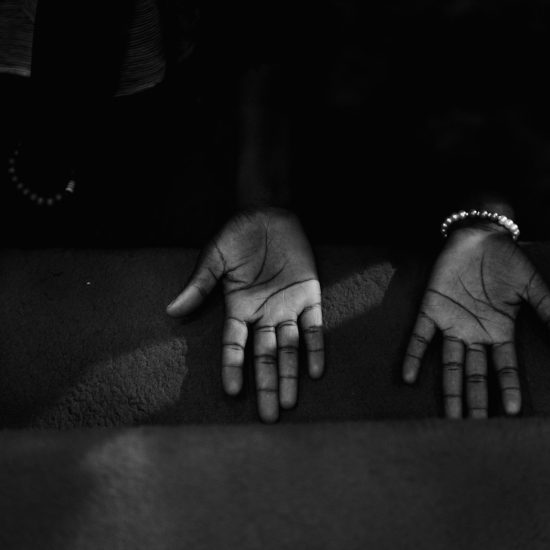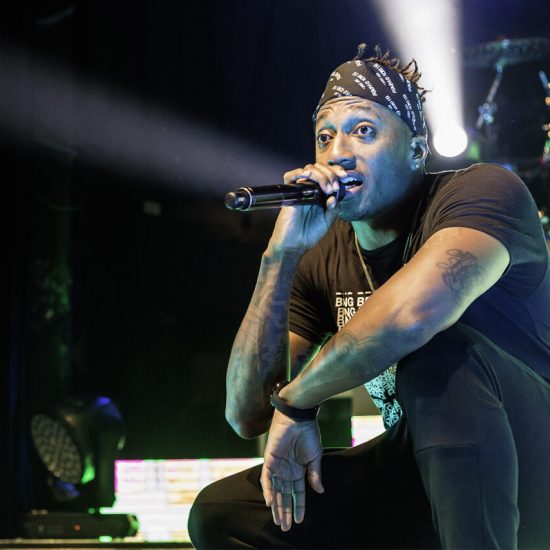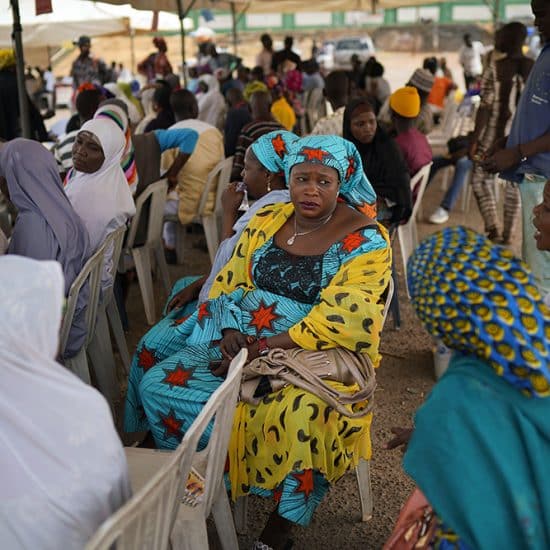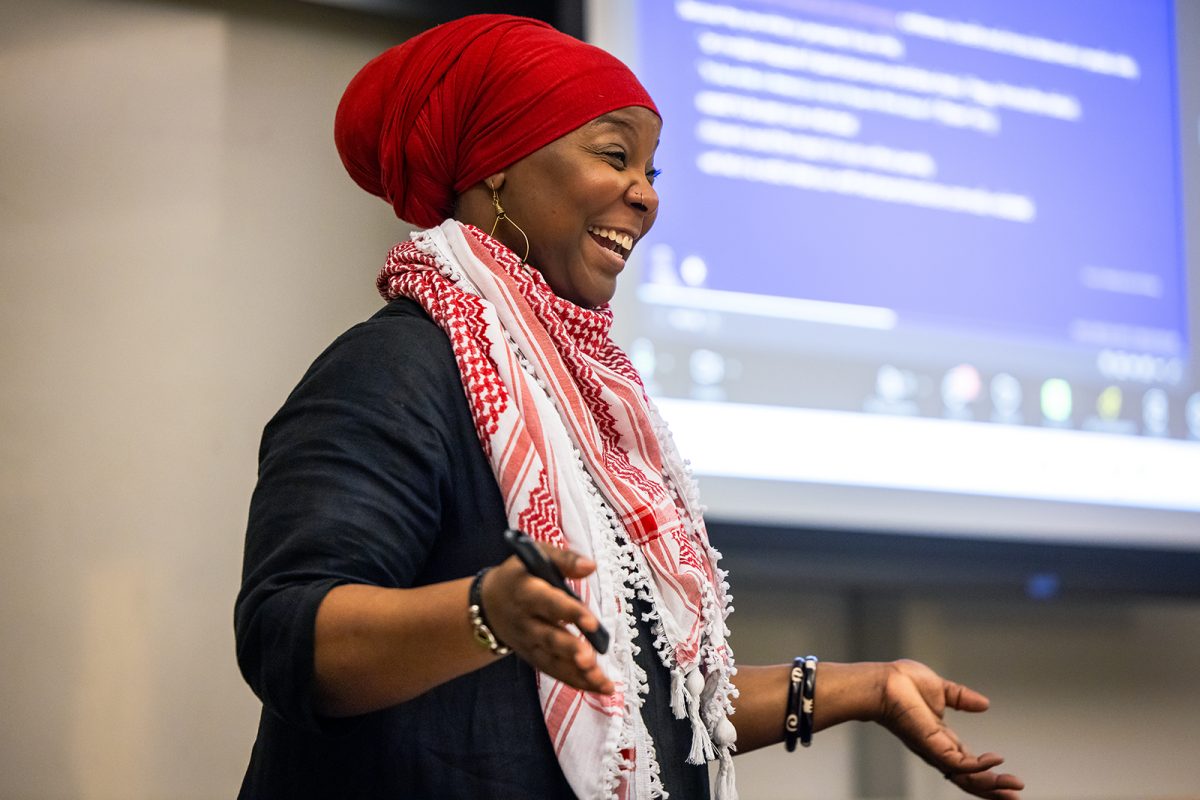
(RNS) — When he remembers the sermon given at his grandmother’s funeral service, Tariq El-Amin describes feeling surprised as the Baptist minister preached. While El-Amin expected a sermon about death and the afterlife, he said the pastor mostly talked about how salvation could only be obtained through Jesus Christ.
“He went into this whole polemic, this whole tirade about how our theology was wrong. You know, saying, ‘Muhammad ain’t going to save you,’” El-Amin recalls.
The only visibly Muslim man in the audience, El-Amin said the sermon sounded like an attempt to belittle his faith. His wife, mother, sisters, and aunt, who wear hijabs, also felt singled out.
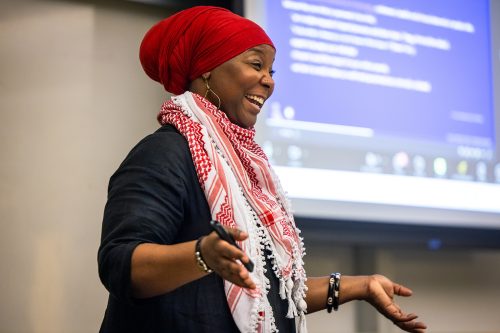
Dr. Kameelah Mu’min Oseguera leads an Institute for Social Policy and Understanding “Day of Learning” workshop at Chicago Theological Seminary in Chicago. (Photo by David T. Kindler)
“He took a moment that should have been about the emotional and spiritual well-being of all of the attendants, in particular the family, and turned it into a time to proselytize,” he said.
When a similar scene played out again at his other grandmother’s funeral, El-Amin wrote a Facebook post about it. He received hundreds of comments from Black Muslims who said they had faced similar situations during Christian funeral services. Reading the comments, El-Amin, whose parents converted to Islam in the 1960s through the Nation of Islam and whose extended family is Christian, realized many Black Muslims feel ostracized or judged by Christian family members.
The flood of responses made him eager to learn more about the relationships between American Black Christians and Black Muslims. He decided to focus his doctoral research at Chicago Theological Seminary’s Bayan Islamic Graduate School on Black Christians’ perceptions of Black Muslims, specifically how funeral services are used to represent those feelings.
Now, El-Amin co-leads workshops, along with Muslim Wellness Foundation founder Kameelah Mu’min Oseguera, that aim to educate Black Christian faith leaders on Islam and debunk misconceptions about American Muslims.
The “Day of Learning” sessions, hosted by the Institute for Social Policy and Understanding and the Muslim Wellness Foundation, a nonprofit promoting well-being among American Muslims, address the findings of an ISPU study on Black Christians’ views of American Muslims.
“It really was an effort to understand, like, experientially, Black Christians’ views of Muslims, of Black Muslims in particular, and doing that exploration without sort of preconceived notions about what it meant or what their experiences would be,” said Oseguera, a Black Muslim woman and the lead researcher on the project.
The qualitative study, set to be published later this year, showed that when asked what they think of when they hear the word “American Muslim,” most Black Christians say they think of Black Muslims or the Nation of Islam, according to a summary of the study shared with Religion News Service.

Kameelah Mu’min Oseguera, left, and Imam Tariq El-Amin during an Institute for Social Policy and Understanding “Day of Learning” workshop at Chicago Theological Seminary in Chicago. (Photo by David T. Kindler)
In the daylong sessions, clergy, chaplains, seminarians, and influential community members learn about key differences between Sunni and Shia Islam, as well as Nation of Islam. The discussions also delve into the relationships — often familial — in America between Black Christians and Black Muslims and the privileges Black Christians can enjoy compared to Black Muslims.
“There’s an assumption of interfaith solidarity or an assumption of understanding based on racial marginalization, right? But there’s never a deep dive into religious privilege that is held by a racial minority,” said Oseguera.
At the end, the Christian leaders discuss strategies to educate their congregations on Islam and improve their understanding of American Muslims.
“That’s really the whole point, right there. It’s like, ‘How do we get the family back together?’” said El-Amin.
The sessions, funded by a grant from Pew Charitable Trust, have so far had 139 participants since they began in December 2023, but the two organizations hope to have 500 Black faith leaders go through the Day of Learning discussions by the end of 2025.
This newest study was sparked by findings from a previous 2019 “ISPU’s American Muslim Poll: Predicting and Preventing Islamophobia” report, which showed non-Muslim Black Americans scored higher than Hispanic and white Americans on the National Islamophobia index.
The 2019 report assessed support for anti-Muslim opinions such as “most Muslims living in the United States are less civilized than other people” and “most Muslims living in the United States are partially responsible for acts of violence carried out by other Muslims.”
The institute’s researchers wanted to understand what was behind these opinions for Black Americans, particularly as the same study showed that, when asked directly about their view of Muslims, about half of non-Muslim Black Americans said they had “no opinion” (51%), while more than a third held positive views (35%), and only 5% admitted to holding negative views.
That’s when ISPU contacted her, said Oseguera, an ISPU adviser. They wanted to know how to interpret that Black Christians, regardless of political affiliation, were endorsing statements connected to anti-Muslim sentiment, Oseguera said.
“My first reaction was, well, what we can’t do is just say that black folks are more Islamophobic than anybody else, right? It just didn’t seem like a very nuanced explanation of that data point. So, my recommendation was that we actually asked black Christians,” she said.
In March 2020, Oseguera and ISPU began conducting focus groups with Black Christians. In total, ISPU interviewed eight focus groups of four to eight participants and conducted six in-depth individual interviews through June 2021.
The interviews showed most participants conflated Islam and the Nation of Islam, a Black nationalist movement founded in the 1930s in Detroit rooted in Islam, often leading them to see Islam as a political orientation rather than a religious belief. As a result, participants showed respect for Islam as a tool of resistance against racist oppression while dismissing it as a faith, noted Oseguera.
The interviews also pointed to a sense of religious superiority that prevented participants from learning about the complexities of the Islamic faith. In interactions between the two communities, this shows up as respecting the practice while simultaneously looking down on Muslims’ conceptualization of the Divine, said Oseguera.
The participants often downplayed religious diversity within African American communities, as they feared acknowledging differences would divide the community and divert its attention from common fights, like racism, according to Oseguera.
The Days of Learning workshops were structured to address each aspect of these responses: learning about Islam, revealing Black Christian privilege, and fostering mutual respect within communities and families.
El-Amin, who is also an Imam at Masjid Al-Taqwa in Chicago, kicked off one of the sessions with an “Islam 101” presentation, explaining the six articles of faith, the shahada, and the pilgrimages.
When discussing Black Christians’ privilege, El-Amin said hosts made sure participants didn’t feel trapped or accused. As they are handed “Christian privilege checklist” cards, faith leaders are invited to reflect on how Black Muslims might be perceived differently than they are.
This part of the workshop is sometimes met with defensiveness, noted Oseguera.
“We’re not talking about characterological flaws, right? We’re saying you have advantages, you have privileges that make for a qualitatively different experience than your Black Muslim cousin.”

The Rev. Stephen Jr. Thurston II. (Photo by Nomee Photography)
During the session’s last part, participants brainstormed ways to transmit what they have learned to their communities.
A few weeks ago, the Rev. Stephen Jr. Thurston II, pastor at Cov, a Baptist church on Chicago’s South Side, attended a Day of Learning session. Now, he wants to discuss Islam and biases against American Muslims with the 900 members of his congregation.
The church, previously known as New Covenant Baptist Church, recently celebrated its 91st anniversary and has had a social justice ministry for years. The congregation helped raise awareness of the HIV/AIDS epidemics and the plight of formerly incarcerated individuals as they tried to reintegrate into society. Soon, Thurston hopes the assembly will have transformative discussions on Islamophobia.
“It takes Christians pushing back against other Christians to get them to stop doing harm to people of the Islamic faith,” he said.
The biggest challenge will be addressing Christian exceptionalism, said the 50-year-old minister. For those raised in theological traditions that leave no room for alternative understandings of the Divine, rooting out disdain for the Islamic faith can be difficult, as they often learn to demonize other faiths, he said.
But showing curiosity for other traditions shouldn’t sound like compromising one’s beliefs, said Thurston.
“A faith that can’t be challenged is a faith that’s already corrupted, in my opinion, and so I will put that on them … Do your work, get your weight up and do your study. You know, firm yourself in what you believe,” he said.
Thurston also wants to call his congregation not to overlook the discrimination faced by minority religious groups.
“When you don’t use your privilege to center other people and to lift up, other people will be marginalized. That’s where the sin comes in for me, and so we need to do a better job of loving, honoring and seeing our Muslim brothers and sisters,” he said.

